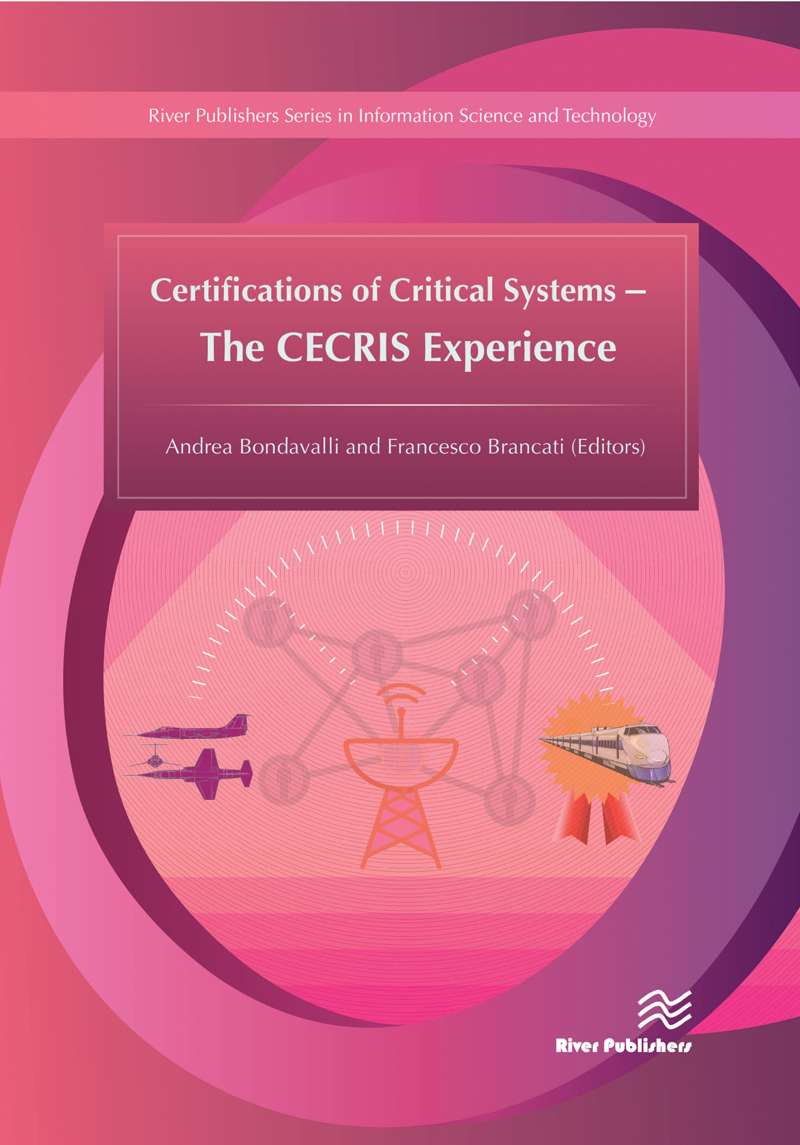River Publishers Series in Computing and Information Science and Technology
Certifications of Critical Systems - The CECRIS Experience
Editors:
Andrea Bondavalli, Consorzio Interuniversitario Nazionale per l'Informatica (CINI), and University of Florence, Italy
Francesco Brancati, ResilTech Srl, Italy
Certifications of Critical Systems - The CECRIS Experience documents the main insights on Cost Effective Verification and Validation processes that were gained during work in the European Research Project CECRIS (Certification of Critical Systems). The objective of the research was to tackle the challenges of certification by focusing on those aspects that turn out to be more difficult/important for current and future critical systems industry: the effective use of methodologies, processes and tools.
Starting from both the scientific and industrial state of the art methodologies for system development and the impact of their usage on the verification and validation and certification of critical systems, the project aimed at developing strategies and techniques supported by automatic or semi-automatic tools and methods for these activities, setting guidelines to support engineers during the planning of the verification and validation phases.
Chapter 1: A Framework to Identify Companies Gaps When Introducing New Standards for Safety-Critical Software
by Andrea Ceccarelli and Nuno Silva
Chapter 2: Experiencing Model-Driven Engineering for Railway Interlocking Systems
by Fabio Scippacercola, Andr´as Zentai and Stefano Russo
Chapter 3: SYSML-UML Like Modeling Environment Based on Google Blockly Customization
by Arun Babu Puthuparambil, Francesco Brancati, Andrea Bondavalli
and Andrea Ceccarelli
Chapter 4: A Process for Finding and Tackling the Main Root Causes that Affect Critical Systems Quality
by Nuno Silva, Francisco Moreira, JoËœao Carlos Cunha,
and Marco Vieira
Chapter 5: Framework for Automation of Hazard Log Management on Large Critical Projects
by Lorenzo Vinerbi and Arun Babu Puthuparambil
Chapter 6: Cost Estimation for Independent Systems Verification and Validation
by Andr´as Pataricza, L´aszl´o G¨onczy, Francesco Brancati,
Francisco Moreira, Nuno Silva3, Rosaria Esposito,
Andrea Bondavalli and Alexandre Esper
Chapter 7: Lightweight Formal Analysis of Requirements
by Andr´as Pataricza, Imre Kocsis, Francesco Brancati,
Lorenzo Vinerbi and Andrea Bondavalli
Chapter 8: STECA – Security Threats, Effects and Criticality Analysis: Definition and Application to Smart Grids
by Mario Rui Baptista, Nuno Silva, Nicola Nostro,
Tommaso Zoppi and Andrea Ceccarelli
Chapter 9: Composable Framework Support for Software-FMEA through Model Execution
by Valentina Bonfiglio1, Francesco Brancati1, Francesco Rossi1, Andrea
Bondavalli2,3, Leonardo Montecchi2,3, Andr´as Pataricza4,
Imre Kocsis4 and Vince Moln´ar4
Chapter 10: A Monitoring and Testing Framework for Critical Off-the-Shelf Applications and Services
by Nuno Antunes, Francesco Brancati, Andrea Ceccarelli,
Andrea Bondavalli and Marco Vieira
Chapter 11: Validating a Safety Critical Railway Application Using Fault Injection
by Ivano Irrera, Andr´as Zentai, Jo˜ao Carlos Cunha,
and Henrique Madeira
